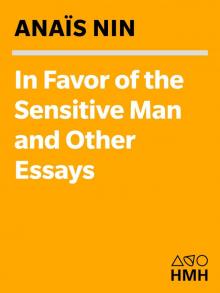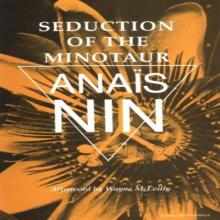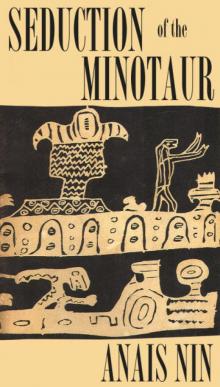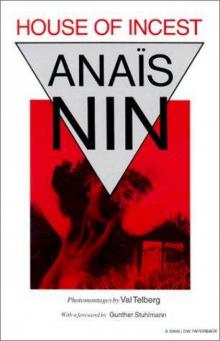The Four-Chambered Heart coti-3 Read online
Page 9
Djuna knew all the prefaces to trouble. If during the ride she had sung in rhythm with others, or laughed, or acquiesced, Rango would begin: “This morning I found your bicycle and the boy’s against the wall of the cafe, so close together, as if you had spent the night together.”
“But Rango, he arrived after me, he merely placed his bicycle next to mine. Everyone has breakfast at the same cafe. It doesn’t mean anything.”
At times Djuna felt that Rango had caught Zora’s madness. Then she felt compassion for him, and would answer with patience, as you would a sick person.
She knew that we love in others some repressed self. In consoling Rango, reassuring him, was she consoling some secret Djuna who had once been jealous and not dared to reveal it?
(We love shadows of our hidden selves in others. Once I must have been as jealous as Rango, but I did not reveal it, even to myself. I must have experienced such jealousy in so hidden a realm of my own nature that I was not even aware of it. Or else I would not be so patient with Rango. I would not feel compassion. He is destroying us both by this jealousy. I want to protect him from the consequences… He is driving me away from him. I should run away now, yet I feel responsible. When we see another daring to be what we did not dare, we feel responsible for him…)
But once she awakened so exhausted by Rango’s demon that she decided to frighten him, to run away, hoping it might cure him.
She packed and went to the station. But there was no train until evening. She sat disconsolately to wait.
And Rango arrived. He looked distracted. “Djuna! Djuna, forgive me. I must have been mad. I didn’t tell you the truth. A friend of mine has been making absinthe in his cellar and every day at noon we have been sampling it. I must have taken a good deal of it all these days.”
She forgave him. She also thought, in an effort always to absolve him: “His slavery to Zora’s needs is so tremendous and he does not dare to rebel. She has a gift for making him feel that he never does enough, and to burden him with guilt, and that may be why, when he comes to me, he has to rebel and be angry about something, he has to explode. I ais scapegoat.”
And she was tied to Rango through this breathing tube, tied to his explosions. She might one day come to believe, as he did, that violence was necessary to dive to the depths of experience.
On these revolving stages of the unconscious, the last hidden jungles of our nature which we have controlled and harnessed almost to extermination, sealing all the wells, it is no wonder when we seek to open these sealed wells again to find a flow of life we find instead a flow of anger.
Thus in anger Rango threw like a geyser this nature’s poison, and then refused to admit responsibility for the storms. His angers came like lightning, and each time Djuna was delivered of her own.
But the black sun of his jealousy eclipsed the Mediterranean sun, churned the sea’s turquoise gentleness.
There were times when she lay alone on the sand and sought to remember what she had tried to reach through the body of Rango, what her first sight of him, playing on his guitar and evoking his gypsy life, had awakened in her.
Through him, to extend into pure nature.
There were times when she remembered his first smile, the ironic smile of the Indian which came from afar like the echo of an ancient Indian smile at the beginning of Mayan worlds; the earthy walk issued from bare footsteps treading paths into the highest mountains of the world, into the most immune lakes and impenetrable forests.
In her dream of him she returned to the origins of the world, hearing footsteps in Rango which were echoes of primeval footsteps hunting.
She remembered, above all, stories, the one Rango had told her about sitting on a rock on top of a glacier and asserting he had felt the spinning of the earth!
She had kissed eyes filled with remembrance of splendors, eyes which had seen the Mayans bury their gold treasures at the bottom of the lakes out of reach of the plundering Spaniards.
She had kissed the Indian princes of her childhood fairytales.
She had plunged with love and desire into the depths of ancient races, and sought heights and depths and magnificence.
And found…found deserts where vultures perpetuated their encirclement, no longer distinguishing between the living and the dead.
Found a muted city resting on ruined columns, cracked cupolas, tombs, with owls screaming like women in childbirth.
In the shadows of volcanoes there were fiestas, orgies, dances, and guitars.
But Rango had not taken her there.
To love he brought only his fierce anxieties; she had embraced, kissed, possessed a mirage. She had walked and walked, not into the TIFY” nd the music, not into laughter, but into the heart of an Indian volcano…
THE TRAP WAS INVISIBLE BY DAY
The trap was a web of senseless duties. No sooner were Djuna’s eyes open than she saw Zora vividly, lying down, pale, with soft flabby hands touching everything with infantile awkwardness. Zora missing her aim, dropping what she held, fumbling with a door, and moving so abnormally slow and with such hazy, uncertain gestures that it took her two hours to get dressed.
Compassion was the cover with which Djuna disguised to her own eyes her revulsion for Zora’s whining voice, unkempt body, and shrewd glance, for her beggar’s clothes which were a costume to attract pity, for the listless hair she was too lazy to brush, for the dead skin through which the blood stagnated.
If one knew what lay in Zora’s mind, one would turn away with revulsion. Djuna had heard her sometimes, half asleep, monotonously accusing doctors, the world, Rango, herself, friends, for all that befell her.
Revulsion. There is a guilt not only for acts committed but for one’s thoughts. Now that the trap had grown so grotesque, futile, stifling, Djuna wished every day that Zora might die. A useless life, grasping food, devotion, service, and giving absolutely nothing, less than nothing. A useless life, exuding poison, envy, a strangling tyranny.
If she died, Rango’s life might soar again, a fire, his body strong and exuberant, his imagination propelling him to all comers of the world. At his worst moments, there was always a fire in him. In Zora there was coldness. Only the mind at work, deforming, denigrating, accusing.
Only a showman left in her. “See my wound, see what I suffer. Love me.”
But love is not given for such reasons.
The trap is inescapable. Djuna has nightmares of Zora’s yellow face and lack of courage. She awakens early, to market for a special bread, a special meat, a special vegetable. There is an appointment for x-rays of the chest, for this week Zora believes she has tuberculosis. Hours wasted on this, only to hear the doctor say: “There’s nothing wrong. Hysterical symptoms. She should be taken to a psychiatrist.”
There is a visit to the pawnbroker, because one must pay the other doctor, the one who made the futile, the dramatic, test for cancer. Djuna’s allowance for the month is finished.
There is no escape. The day crumbles soon after it is born. The only tree she will see will be the anemic tree of the hospital garden.
A useless, abortive sacrifice gives sadness.
The day is the trap, but she does not dare revolt. If she wants her half-night with Rango, this is the only path to reach it. At the end of the day there will be his fervent kisses, his emotion, his desire, the bites of hunger on the shoulder, vibrations of pleasure shaking the body, the guttural moans of men and women returning to their primitive origin…
Sometimes there is no time for undressing. At others, the climax is postponed teasingly, arousing frenzy. The dross of the day is burned away.
When Djuna thinks during the day, “I must run away. I must leave Rango to his chosen torment,” it is the remembrance of this point of fire which binds her.
How can Rango admire Zora’s rotting away—not even a noble suicide, but a fixed obsession to die slowly, dragging others along with her? A life ugly and monstrous. If she washes a dish, she complains. If she sews a button, she laments
.
These are Djuna’s thoughts, and she must atone for them too. Zora, take this bread I traveled an hour to find, it won’t nourish you, you are too full of poison within your body. Your first words to me were hypocritical, your talk about praying to be helped, and being glad I was the one, yes, because I was one who could be easily caught through compassion. You knew I would act toward you as you would never have acted toward me. I have tried to imagine you in my place, and I couldn’t. I know you would be utterly cruel.
On her way back to the barge she bought new candles, and a fur rug to lie on, because Rango believed it was too bourgeois to sleep on a bed like everybody else. They slept on the floor. Perhaps a fur, the bed of Eskimos, would be appropriate.
When Rango came, he looked at the candles and the fur like a lion looking at a lettuce leaf. But lying on it, his bronze desire is aroused and the primitive bed is baptized in memory of cavernous dwellings.
At this hour children are reading fairy tales from which Rango and Djuna were led to expect such marvels, the impossible. Rango had imagined a life without work, without responsibilities. Djuna had wanted a life of desire and freedom, not comfort but the smoothness of magical happenings, not luxury but beauty, not security but fulfillment, not perfection but a perfect moment like this one…but without Zora waiting to lie between them like an incubus…
Djuna was unprepared for Rango’s making the first leap out of the trap. It came unexpectedly at midnight as they were about to separate. Out of the fog of enswathing caresses came his voice: “We’re leading a selfish life. There are many things happening in the world; we should be working for them. You are like all the artists, with your big floodlights fixed on the sky, and never on earth, where things are happening. There is a revolution going on, and I want to help.”
Djuna did not think of the world or the revolution needing Rango, Rango and his bohemian indiscipline, his love of red wine, his laziness. She felt that Zora’s persecutions were driving him away. He was caught between a woman who wanted to die, and one who wanted to live! He had hoped to amalgamate the women, so he would not feel the tension between his two selves. He had thought only of his own emotional comfort. He had overlooked Zora’s egoistic ferocity, and Djuna’s clairvoyance. The alliance was a failure.
Now he was driven to risk his life for some impersonal task.
She was silent. She looked at ace and saw that his mouth looked unhappy, wounded, and revealed his desperateness. He kept it tightly shut, as women do when they don’t want to weep. His mouth which was not in keeping with his lion’s head, which was the mouth of a child, small and vulnerable; the mouth which aroused her indulgence.
Parting at the corner of the street, they kissed desperately as if for a long voyage. A beggar started to play on his violin, then stopped, thinking they were lovers who would never see each other again.
The blood beat in her ears as she walked away, her body parting from Rango in anticipation, hair parting from hair, hands unlocking, lips closing against the last kiss, surrendering him to a more demanding mistress: the revolution.
The earth was turning fast. Women cannot walk out of the traps of love, but men can; they have wars and revolutions to attend to. What would happen now? She knew. One signed five sheets of paper and answered minute, excruciatingly exact questions. She had seen the questionnaire. One had to say whether one’s wife or husband believed in the revolution; one had to tell everything. Rango would be filling these pages slowly, with his nervous, rolling, and swaying handwriting. Everything. He would probably say that his wife was a cripple, but the party would not condone a mistress.
Then suddenly the earth ceased turning and the blood no longer rang in her ear. Everything stood deathly still because she remembered the dangers. She remembered Rango’s friend who had been found with a bullet hole in his temple, near the cafe where they met. She remembered Rango’s story about one of the men who worked for the revolution in Guatemala: the one who had been placed in a jail half full of water until his legs rotted away in strips of moldy flesh, until his eyes turned absolutely white.
The next evening Rango was late. Djuna forgot that he was always late. She thought: he has signed all the papers, and been told that a member of the party cannot have a mistress.
It was nine o’clock. She had not eaten. It was raining. Friends came into the cafe, talked a little, and left. The time seemed long because of the anxiety. This is the way it would be, the waiting, and never knowing, if Rango were still alive. He would be so easily detected. A foreigner, dark skin, wild hair, his very appearance was the one policemen expected from a man working for the revolution.
What had happened to Rango? She picked up a newspaper. Once he had said: “I picked up a newspaper and saw on the front page the photograph of my best friend, murdered the night before.”
That is the way it would happen. Rango would kiss her as he had kissed her the night before at the street corner, with the violin playing, then the violin would stop, and that very night…
She questioned her instinct. No, Rango was not dead. She would like to go to church, but that was forbidden, too. Despair was forbidden. This was the time for stoicism.
She was jealous of Rango’s admiration for Gauguin’s mother, a South American heroine, who had fought in revolutions and shot her own husband when he betrayed the party.
Djuna walked past the church and entered. She could not pray because she was seeking to transform herself into the proper mate for a revolutionist. But she always felt a humorous, a private, connivance with god. She felt he would always smile with irony upon her most wayward acts. He would see the contradictions, and be indulgent. There was a pact between them, even if she were considered guilty before most tribunals. It was like her friendliness with the policemen of Paris.
And now Rango walked toward her! (See what a pact she had with god that he granted her wishes no one else would have dared to expect him to grant!)
Rango had been ill. No, he had not signed the papers. He had overslept. Tomorrow. Manana.
Djuna had forgotten this Latin deity: Manana.
At the Cafe Martiniquaise, near the barge, Rango and Djuna sat drinking coffee.
The place was dense with smoke, voices, faces, heaving and swaying like a compact sonorous wave, washing over them at times and enswathing them, at others retreating as if subdued, only to return again louder and more suffocating to engulf their voices.
Djuna could never identify such a tide of faces dissolved by lights and shadows, slightly blurred in outlines from drink. But Rango could say immediately: “There’s a pimp, there’s a prizefighter. There’s a drug addict.”
Two friends of Rango’s walked in, with their hands in their pockets, greeted them obliquely, with heavy lids half dropped over glazed eyes. They had deep purple shadows under the eyes and Rango said: “It startles me to see my friends disintegrating so fast, even dying, from drugs. I’m no longer drawn to this kind of life.”
“You were drawn toward destruction before, weren’t you?”
“Yes,” said Rango, “but not really. When I was a young man, at home, what I liked most was health, physical energy and well-being. It was only later, here in Paris the poets taught me not to value life, that it was more romantic to be desperate, more noble to rebel, and to die, than to accept what ordinary life had to offer. I’m not drawn to that any more. I want to live. That was not the real me. Zora says you changed me, yet I can’t think of anything you said or did to accomplish it. But every time we are together I want to accomplish something, something big. I don’t want any more of this literary credo, about the romantic beauty of living desperately, dangerously, destructively.”
Djuna thought with irony that she had not meant to give birth to a rebel. She had changed, too, because of Rango. She had acquired some of his gypsy ways, some of his nonchalance, his bohemian indiscipline. She had swung with him into the disorders of strewn clothes, spilled cigarette ashes, slipping into bed all dressed, falling asleep thus,
indolence, timelessness… A region of chaos and moonlight. She liked it there. It was the atmosphere of earth’s womb, where awareness could not reach and illumine all the tragic aspects of unfulfilled desires. In the darkness, chaos, warmt one forgot… And the silence. She liked the silence most of all. The silence in which the body, the senses, the instincts, are more alert, more powerful, more sensitized, live a more richly perfumed and intoxicating life, instead of transmuting into thoughts, words, into exquisite abstractions, mathematics of emotion in place of the violent impact, the volcanic eruptions of fever, lust, and delight.
Irony. Now Rango was projecting himself out of this realm, and wanted action. No more time for the guitar which had ensorcelled her, no more time to visit the gypsies as he had once promised, no more time to sleep in the morning as she had been learning, or to acquire by osmosis his art of throwing off responsibilities, his self-indulgence, his recklessness…
As they sat in the cafe, he condemned his past life. He was full of contrition for the wasted hours, the wasted energy, the wasted years. He wanted a more austere life, action and fulfillment.
Suddenly Djuna looked down at her coffee and her eyes filled with stinging tears; the tears of irony burn the skin more fiercely. She wept because she had aroused in Rango the desire to serve a purpose which was not hers, to live now for others when already he lived for Zora, and had so little to give her of himself. She wept because they were so close in that earthy darkness, close in the magnetic pull between their skins, their hair, their bodies, and yet their dreams never touched at any point, their vision of life, their attitudes. She wept over the many dislocations of life, forbidding the absolute unity.
Rango did not understand.
In the realm of ideas he was always restless, impatient, and like some wild animal who feared to be corralled. He often described how the horses, the bulls, were corralled in his ranch. He delighted in the fierceness of the battle. For him to examine, to understand, to interpret was exactly like some corralling activity, of which he was suspicious.

 Diary of Anais Nin, Volume 5
Diary of Anais Nin, Volume 5 A Spy in the House of Love
A Spy in the House of Love In Favor of the Sensitive Man and Other Essays (Original Harvest Book; Hb333)
In Favor of the Sensitive Man and Other Essays (Original Harvest Book; Hb333) Collages
Collages Seduction of the Minotaur
Seduction of the Minotaur Children of the Albatross
Children of the Albatross Delta of Venus
Delta of Venus The Four-Chambered Heart coti-3
The Four-Chambered Heart coti-3 Diary of Anais Nin, Volume 2
Diary of Anais Nin, Volume 2 Diary of Anais Nin, Volume 1
Diary of Anais Nin, Volume 1 Diary of Anais Nin, Volume 4
Diary of Anais Nin, Volume 4 The Winter of Artifice
The Winter of Artifice Seduction of the Minotaur coti-5
Seduction of the Minotaur coti-5 Children of the Albatross coti-2
Children of the Albatross coti-2 Henry and June: From A Journal of Love -The Unexpurgated Diary of Anaïs Nin (1931-1932)
Henry and June: From A Journal of Love -The Unexpurgated Diary of Anaïs Nin (1931-1932) Ladders to Fire
Ladders to Fire House of Incest
House of Incest